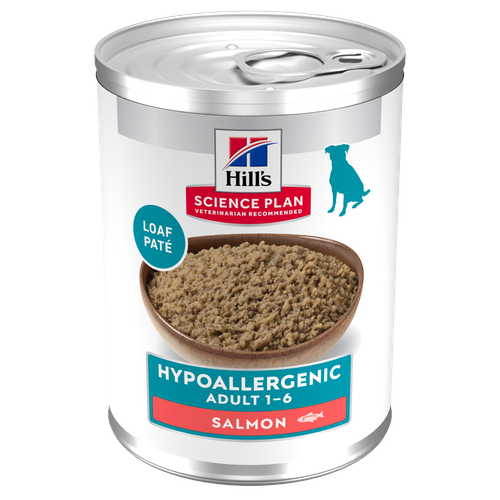
-
Find the right food for your petTake this quiz to see which food may be the best for your furry friend.Find the right food for your petTake this quiz to see which food may be the best for your furry friend.Featured products
 Mature Adult Dog Food
Mature Adult Dog FoodHill's Science Plan Mature Adult Multipack Wet Dog Food with Chicken & Beef are complete premium pet foods for mature adult dogs from 7 years. Your dog will love these deliciously smooth and savoury minced loaves, formulated to deliver the appropriate amount of energy to support the needs of adult dogs.
Shop Now Puppy Food
Puppy FoodHill's Science Plan Puppy Multipack Wet Dog Food with Chicken & Beef are complete premium pet foods for growing puppies from weaning until 1 year old and for pregnant and nursing dogs. Your puppy will love these deliciously smooth and savoury minced loaves, formulated for balanced nutrition and overall health.
Shop Now Adult Wet Dog Food with Beef
Adult Wet Dog Food with BeefHill's Science Plan Adult Multipack Wet Dog Food with Chicken, Beef & Turkey are complete premium pet foods for adult dogs from 1 year. Your dog will love these deliciously smooth and savoury minced loaves, formulated for balanced nutrition and overall health.
Shop NowFeatured products Light Adult Multipack Wet Cat Food with Chicken & Ocean Fish
Light Adult Multipack Wet Cat Food with Chicken & Ocean FishTender chicken chunks in gravy for cats, with L-carnitine and fewer calories for ideal weight management. Packed with high-quality protein, omega-6s, and vitamin E for shiny fur and healthy skin.
Shop Now Adult Multipack Wet Cat Food with Beef, Ocean Fish & Chicken
Adult Multipack Wet Cat Food with Beef, Ocean Fish & ChickenTender chunks in gravy for cats, with high-quality protein to maintain lean muscle. With vitamin E and omega-3s & -6s for healthy skin and balanced minerals to support healthy vital organs.
Shop Now Mature Adult Wet Cat Food with Chicken
Mature Adult Wet Cat Food with Chicken
Tender chicken chunks in gravy for mature adult cats. Made with easy-to-digest ingredients, high-quality protein for lean muscle maintenance and antioxidant vitamins C+E for optimal health.
Shop Now -
Dog
- Dog Tips & Articles
-
Health Category
- Weight
- Food & Environmental Sensitivities
- Urinary
- Digestive
- Joint
- Kidney
-
Life Stage
- Puppy Nutrition
- Adult Nutrition
- Senior Nutrition
Cat- Cat Tips & Articles
-
Health Category
- Weight
- Skin & Food Sensitivities
- Urinary
- Digestive
- Kidney
-
Life Stage
- Kitten Nutrition
- Adult Nutrition
Featured articles The Right Diet For Your Pet
The Right Diet For Your PetIn people, the right diet is very important. If you are eating the wrong way for your metabolism, activity level, age and lifestyle you could end up with health issues.
Read More Show some love with wet foods: a great choice for pets with health issues
Show some love with wet foods: a great choice for pets with health issuesShow some love with wet foods: a great choice for pets with health issues.
Read More The Incredible Science Behind Your Pet's Microbiome
The Incredible Science Behind Your Pet's MicrobiomeLearn what your pet's microbiome is, how it contributes to your pet's gut and overall health, and why nutrition is important in maintaining healthy microbiomes.
Read More -


Nowadays, we all lead busier and busier lives. The word ‘stress’ is used a lot when it comes to humans, but stress can be a big problem for our dogs as well. It can cause lots of health issues in the short and long term, including digestive upsets like diarrhoea and colitis. If you notice changes in your dog’s poo, like mucus or blood, or see that they keep getting bouts of diarrhoea, it could be that stress is playing a part. In this article we’ll look at what causes stress in dogs, what effect that might have and a look at what you can do about it.
Causes of stress in dogs
Lots of things can cause stress in dogs. The most common ones are:
Separation anxiety.
A stay in kennels.
A new baby or relatives coming to stay.
You going on holiday. Even the sight of your suitcases coming out from under the bed can trigger stress.
A traumatic event like a fight with another dog.
Sound phobias like fireworks.
Breed. Some breeds of dog are particularly prone to stress.
Maternal stress. Trauma or stress in a pregnant dog can affect how likely the puppies are to be stressed in their lives.
Breeds of dog that are prone to stress
Stress can happen in any breed or crossbreed, but there are some breeds of dog that definitely seem more likely to be anxious and stressed. In my experience in practice, it tends to be smaller breeds and lapdogs, such as Cavalier King Charles spaniels, cocker spaniels and Bichon frise, but bigger breeds, such as border collies and German shepherds, may also be affected.


Tasty Tips
How does stress affect your dog’s body and health?
You may be surprised to know that stress is actually essential for life! The stress response helps save us in times of trouble. Acute stress, like being frightened walking alone in the dark, causes the release of adrenaline. This is essential to get you ready for fight or flight. Chronic or long-term stress, however, is a little different. When we, and our animals, are stressed for a long time, it causes the release of steroid hormones. Steroids are essential for life in small amounts and are excellent anti-inflammatories. However, they also affect the immune system in the way they work. Over time, the constant release of steroids suppresses the immune system and leaves the body vulnerable to infections, not to mention many other detrimental effects.
Recent studies have shown that there is a hugely important link between the gut, the brain and the immune system. So you can see that if an animal is stressed, anxious or depressed, the gut is one of the first systems to show it. It can cause all sorts of digestive upsets, such as vomiting, diarrhoea, colitis and excessive wind – none of which are much fun for you or your dog!
In the longer term, stress can cause lethargy and lack of energy, poor coat quality, skin problems and loss of appetite, as well as leaving the body susceptible to infection, as we mentioned.
What can you do to reduce stress in your dog?
Prevention is always better than cure, so try to get a dog that isn’t likely to be stressed in the first place! Dogs that have been raised in family homes, are well-socialised and habituated, and have calm mothers are much more likely to be well-balanced individuals later in life.
If you’ve taken on a dog and you don’t know their background, but they suffer from stress, talk to your vet. There are medications and pheromone diffusers that can help, as can seeing a good behaviour specialist. There may be subtle changes you can make at home to really help your dog feel more relaxed.
It might surprise you that there are also some foods that can help with stress. Highly digestible, balanced, complete foods for digestive health will definitely help if your dog has gut-related signs of stress, but there are also foods that have natural additives that are proven to reduce stress, too.
Stress in dogs can have many causes and many effects, but don’t despair – the more we understand about these complex animals, the more ways we have to help. If ever you think your dog is feeling anxious or suffering from stress, have a chat with your vet. The sooner you start to look at why, the sooner you can start to make your dog feel happier.
Reviewed by Dr. Hein Meyer, DVM, PhD, Dipl-ECVIM-CA


One of our staff authors prepared this article for you
Related products

Hill's Science Plan Adult Multipack Wet Dog Food with Chicken, Beef & Turkey are complete premium pet foods for adult dogs from 1 year. Your dog will love these deliciously smooth and savoury minced loaves, formulated for balanced nutrition and overall health.

Hill's Science Plan Hypoallergenic Adult Wet Dog Food with Salmon is a complete premium pet food for all adult dogs from 1 year. This savoury tinned loaf is specially formulated for dogs with delicate skin and stomachs. It features a single novel animal protein source and is grain-free.

Hill's Science Plan Puppy Multipack Wet Dog Food with Chicken & Beef are complete premium pet foods for growing puppies from weaning until 1 year old and for pregnant and nursing dogs. Your puppy will love these deliciously smooth and savoury minced loaves, formulated for balanced nutrition and overall health.

Hill's Science Plan Mature Adult Multipack Wet Dog Food with Chicken & Beef are complete premium pet foods for mature adult dogs from 7 years. Your dog will love these deliciously smooth and savoury minced loaves, formulated to deliver the appropriate amount of energy to support the needs of adult dogs.
Related articles

Learn effective tips for feeding a dog that's a picky eater and ensure proper nutrition for a finicky eater. Discover tips for pet parents at Hill's Pet UK.

Learn about the potential health risks of a raw diet for dogs and why they aren't the best option for your pup or you.

Many human foods are dangerous to dogs. Read about 5 of the worst toxic food offenders that can kill your dog - and how much it takes to hurt them.

How, when and what to feed your new puppy is an important decision, learn more about the things to consider for feeding your puppy.

Put your dog on a diet without them knowing
Our low calorie formula helps you control your dog's weight. It's packed with high-quality protein for building lean muscles, and made with purposeful ingredients for a flavourful, nutritious meal. Clinically proven antioxidants, Vitamin C+E, help promote a healthy immune system.
Put your dog on a diet without them knowing
Our low calorie formula helps you control your dog's weight. It's packed with high-quality protein for building lean muscles, and made with purposeful ingredients for a flavourful, nutritious meal. Clinically proven antioxidants, Vitamin C+E, help promote a healthy immune system.

